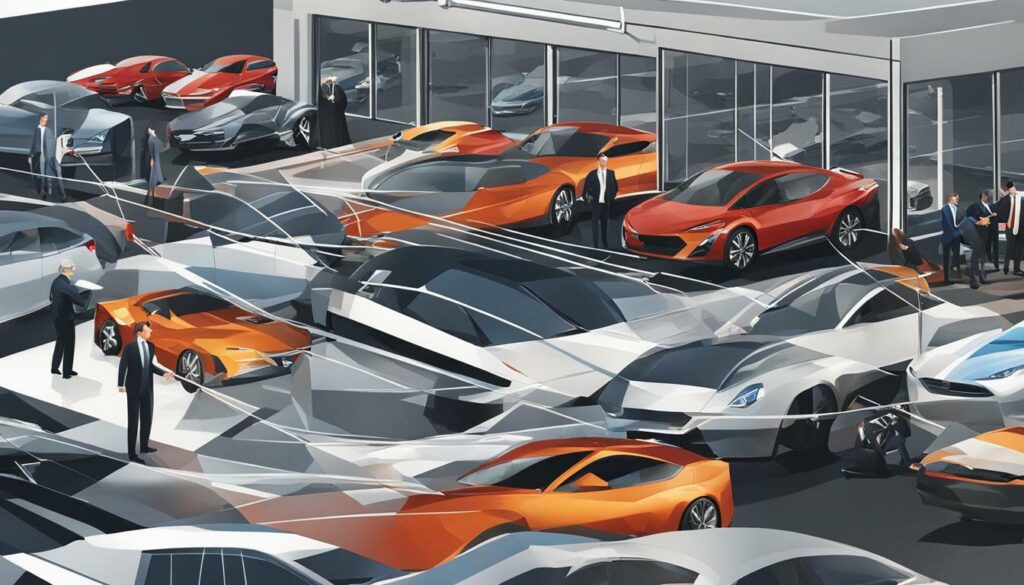The automotive industry is experiencing a paradigm shift in its marketing, distribution, and selling practices, with a particular focus on channel sales and partnerships. Traditional dealer networks and sales models are being challenged by new concepts and technologies that aim to improve customer satisfaction and streamline the buying process. The rise of internet-based services has allowed consumers to have more control over their research and purchase decisions. Automotive manufacturers are now focusing on omnichannel selling, integrating digital and physical channels to create a seamless customer experience. By optimizing each touchpoint in the sales journey, dealers can provide personalized information, offers, and customer care. This shift towards a customer-centric approach is expected to continue in the future, with a focus on enhancing the overall buying experience and increasing sales potential.
Key Takeaways:
- The automotive industry is undergoing a transformation in its marketing, distribution, and selling practices.
- Channel sales and partnerships play a significant role in this shift.
- Internet-based services have empowered consumers and changed their buying behavior.
- Omnichannel selling, integrating digital and physical channels, is crucial for a seamless customer experience.
- The industry is focused on enhancing the buying experience and increasing sales potential through customer-centric approaches.
Understanding Channel Sales in the Automotive Industry
Channel sales in the automotive industry involve strategic partnerships and reseller collaborations that enable manufacturers to expand their market reach. These channel partnerships play a vital role in the overall distribution and sales process, allowing automotive companies to connect with a wider customer base and improve the buying experience. By working together with channel partners, manufacturers can leverage their expertise and resources to effectively promote and sell their products.
The automotive industry is witnessing a transformation in its marketing and sales practices, driven by the rise of digital technologies and changing consumer behavior. As customers increasingly research and purchase vehicles online, automotive manufacturers are adapting their channel sales strategies to incorporate digital channels. This includes utilizing online platforms, social media, and data-driven marketing to target and engage with customers.
One of the key advantages of channel sales in the automotive industry is the ability to provide personalized information, offers, and customer care across multiple touchpoints. By integrating digital and physical channels, manufacturers can create a seamless buying process for customers, allowing them to interact with the brand through various mediums. This omnichannel approach enhances the overall customer experience and improves customer satisfaction, leading to increased sales potential.
Benefits of Channel Sales in the Automotive Industry
| Benefits | Description |
|---|---|
| Expanded Market Reach | Channel partnerships enable manufacturers to reach a wider customer base and tap into new markets. |
| Improved Buying Experience | By integrating digital and physical channels, manufacturers can create a seamless and personalized buying process for customers. |
| Increased Sales Potential | Effective channel sales strategies can lead to higher sales volumes and revenue for automotive manufacturers. |
| Access to Expertise and Resources | Channel partners bring specialized knowledge and resources that can enhance the marketing and distribution efforts of manufacturers. |
As the automotive industry continues to evolve, channel sales and reseller partnerships will play a critical role in driving growth and success. By embracing digital channels, optimizing each touchpoint in the sales journey, and focusing on the overall customer experience, manufacturers can stay ahead in a rapidly changing market. Building and maintaining effective channel partnerships will be key to capitalizing on the opportunities available in the automotive sector.

“Channel sales in the automotive industry involve strategic partnerships and reseller collaborations that enable manufacturers to expand their market reach.”
Evolution of Sales Models in the Automotive Industry
The automotive industry has witnessed a significant shift in sales models, as traditional dealer networks give way to customer-centric approaches. The advent of internet-based services has empowered consumers, allowing them to take control of their research and purchase decisions. This transformation has prompted automotive manufacturers to adopt new strategies that prioritize customer satisfaction and create a seamless buying experience.
One key aspect of this evolution is the integration of digital and physical channels. By optimizing each touchpoint in the sales journey, dealers can provide personalized information, offers, and customer care. The goal is to create a cohesive and engaging experience for the customer, whether they are interacting online or in person at a dealership. This shift towards omnichannel selling not only improves customer satisfaction but also opens up new opportunities for sales and growth.
In order to effectively navigate this changing landscape, automotive manufacturers need to build strong channel partnerships. These collaborations with resellers and channel partners help expand their reach and provide a wider customer base. Building successful channel partnerships requires shared values, trust, and mutually beneficial goals. By working together, manufacturers and their partners can leverage each other’s strengths and create a win-win situation.
Benefits of Channel Partnerships in the Automotive Industry
| Benefits | Explanation |
|---|---|
| Increased Market Reach | Partnerships allow manufacturers to reach a wider audience through reseller networks. |
| Access to Expertise | Channel partners bring specialized knowledge and skills that complement the manufacturer’s offerings. |
| Cost-Effective Distribution | By leveraging existing reseller networks, manufacturers can reduce distribution costs. |
| Improved Customer Support | Partnerships enable manufacturers to provide localized customer support through their partner’s network. |
As the automotive industry continues to evolve, the focus on customer-centric sales models and channel partnerships will only grow stronger. Manufacturers need to embrace the integration of digital and physical channels to create a seamless buying process. By building effective channel partnerships, they can expand their reach, leverage expertise, and provide exceptional customer support. The future of channel sales in the automotive industry lies in delivering personalized experiences and enhancing the overall buying journey.

Digital channels have become indispensable in the automotive industry’s channel sales, enabling manufacturers to provide a personalized and seamless customer experience. The integration of online platforms and technologies has revolutionized the way cars are marketed and sold, empowering consumers and transforming traditional sales models.
By leveraging digital channels, automotive manufacturers can optimize each touchpoint in the sales journey, from initial research to after-sales service. Websites, social media platforms, and mobile applications allow customers to explore various car models, compare prices, and access real-time inventory information. This wealth of information empowers consumers to make informed decisions, ultimately improving customer satisfaction.
In addition to providing information, digital channels also facilitate communication and engagement between manufacturers, dealers, and customers. Online chat features, virtual showrooms, and interactive configurators enable customers to interact with brands and customize their car-buying experience. This personalized approach creates a sense of ownership and builds trust, increasing the likelihood of a purchase.

The seamless integration of digital channels with physical dealerships is key to providing a cohesive customer experience. Showrooms equipped with interactive touchscreens, augmented reality tools, and virtual reality simulations enhance the in-person buying process. Customers can visualize different options, explore features, and even take virtual test drives before making a final decision.
In conclusion, digital channels play a pivotal role in channel sales in the automotive industry. Manufacturers that embrace digital transformation and integrate online platforms with physical showrooms are better positioned to meet the evolving needs and expectations of modern car buyers. By providing personalized information, offers, and customer care, automotive brands can create a seamless buying process that enhances customer satisfaction and drives sales.
Building Effective Channel Partnerships in the Automotive Industry
Building effective channel partnerships is crucial in the automotive industry, requiring shared values, trust, and mutually beneficial goals. In the ever-evolving landscape of automotive channel sales, manufacturers and resellers must work together to reach a wider customer base and enhance the overall buying experience. By collaborating with channel partners, automotive manufacturers can leverage their expertise and resources to optimize distribution networks and create value for customers.
One of the key factors in building successful channel partnerships is having shared values. When manufacturers and resellers align their values and vision, they can work together towards a common goal. Trust is another essential element, as it establishes a strong foundation for collaboration and ensures transparency throughout the partnership. By fostering trust, manufacturers and resellers can develop long-term relationships that drive mutual growth.
Another critical aspect of effective channel partnerships is the identification of mutually beneficial goals. Manufacturers and resellers must align their objectives to create win-win situations. This can be achieved by understanding each other’s strengths and leveraging them to maximize sales potential. The collaborative efforts of manufacturers and resellers can lead to improved market penetration, increased customer satisfaction, and enhanced profitability.
Benefits of Building Channel Partnerships in the Automotive Industry
| Benefits | Explanation |
|---|---|
| Expanded Reach | Collaborating with resellers allows manufacturers to tap into their existing customer base and expand market reach. |
| Market Insights | Resellers have a deep understanding of local markets, providing manufacturers with valuable insights for product development and marketing strategies. |
| Efficient Distribution | Channel partnerships optimize distribution networks, ensuring timely delivery and reducing logistics costs. |
| Enhanced Customer Experience | By working together, manufacturers and resellers can provide a seamless, personalized buying experience for customers. |
Building effective channel partnerships in the automotive industry is a collaborative effort that requires open communication, mutual respect, and a commitment to excellence. Manufacturers and resellers who invest in strong partnerships are better positioned to navigate the changing landscape of automotive channel sales and meet the evolving needs of customers.

Channel Sales Strategies for Enhanced Customer Experience
Channel sales strategies in the automotive industry prioritize the customer experience, offering personalized information, offers, and customer care across multiple touchpoints. With the aim of creating a seamless buying process, automotive manufacturers are integrating digital and physical channels to provide a holistic and convenient experience for customers. This customer-centric approach recognizes the importance of optimizing each touchpoint in the sales journey, from initial research to final purchase and beyond.
One key aspect of channel sales strategies is the integration of online platforms and technologies. Automotive companies are utilizing the power of digital channels to engage with customers and provide them with relevant information. Through websites, social media platforms, and interactive tools, manufacturers can showcase their products, share detailed specifications, and offer virtual test drives. This allows customers to explore different options and make informed decisions from the comfort of their own homes.
“Digital channels have transformed the way customers interact with automotive brands. They have the power to research, compare, and ultimately make purchase decisions online. By integrating digital channels into their channel sales strategies, automotive manufacturers can meet customers where they are and offer personalized experiences that cater to their specific needs.”
The integration of digital and physical channels also allows for a seamless transition between online research and offline experiences. Customers can start their car buying journey online and then visit a dealership to see the vehicle in person, test drive it, and discuss financing options. This omnichannel approach ensures that customers receive consistent information and support throughout their buying process, enhancing their overall experience and satisfaction.

For dealerships and reseller partners, focusing on channel sales strategies that enhance the customer experience can lead to increased loyalty and retention. By providing personalized offers, transparent pricing, and exceptional customer service, dealers can create lasting relationships with their customers. This, in turn, can result in positive word-of-mouth referrals and repeat business, contributing to long-term success in the automotive industry.
Benefits of Channel Sales Strategies for Enhanced Customer Experience
| Benefits | Description |
|---|---|
| Improved customer satisfaction | By prioritizing the customer experience, channel sales strategies aim to meet and exceed customer expectations, leading to higher levels of satisfaction. |
| Increased sales potential | Providing personalized information and offers can attract more customers and convert leads into sales, thereby maximizing sales potential. |
| Enhanced brand reputation | A customer-centric approach sends a positive message about the brand, demonstrating a commitment to meeting customer needs and building trust. |
| Stronger dealer-customer relationships | By focusing on personalized customer care, dealerships can establish strong relationships with customers, leading to loyalty and repeat business. |
As the automotive industry continues to evolve, channel sales strategies that prioritize the customer experience will remain essential for success. By leveraging digital channels, integrating online and offline experiences, and building strong relationships with customers, automotive manufacturers and dealerships can secure a competitive edge in the market and thrive in a rapidly evolving industry.
The Future of Channel Sales in the Automotive Industry
The future of channel sales in the automotive industry holds promising advancements and a continued focus on enhancing the overall buying experience. As the industry undergoes a transformation, automotive manufacturers are embracing new concepts and technologies to meet the changing demands of consumers. By integrating digital and physical channels, dealers can create a seamless customer experience that combines the convenience of online platforms with the personalized service of in-person interactions.
One of the key advancements in channel sales is the rise of omnichannel selling. This approach allows automotive manufacturers to optimize each touchpoint in the sales journey, ensuring that customers receive personalized information, offers, and customer care. By leveraging digital channels, dealers can provide a more interactive and engaging buying process, allowing customers to research, compare, and customize their vehicle options in a way that suits their preferences. This integration of digital and physical channels not only improves the overall buying experience but also increases sales potential by reaching a wider customer base.
The Role of Digital Channels in Channel Sales
Digital channels play a crucial role in the future of channel sales in the automotive industry. With the rise of internet-based services, consumers now have more control over their research and purchase decisions. Automotive manufacturers are leveraging this trend by integrating online platforms and technologies into their sales strategies. By providing personalized information, offers, and customer care across various touchpoints, dealers can meet the evolving needs and expectations of customers. This includes features such as virtual showrooms, interactive configurators, and online financing options, all aimed at enhancing the buying experience and building customer loyalty.
“The integration of digital channels in channel sales allows automotive manufacturers to provide a seamless and personalized buying experience for customers.”
The future of channel sales in the automotive industry holds immense potential for growth and innovation. By embracing customer-centric approaches, focusing on enhancing the overall buying experience, and leveraging the power of digital channels, automotive manufacturers can stay ahead in a rapidly evolving industry. The key lies in continuously evaluating and adapting sales strategies to meet the changing needs and expectations of customers. As technology advances and consumer preferences shift, automotive manufacturers must be agile and proactive in order to thrive in the competitive landscape.

Automotive channel sales present both challenges and opportunities, requiring manufacturers to navigate potential obstacles while embracing growth and innovation. The industry is facing a significant transformation in its marketing, distribution, and selling practices, driven by the rise of internet-based services and the empowerment of consumers in their research and purchase decisions.
One of the key challenges for manufacturers is the need to adapt to the changing landscape of consumer behavior. Customers are now more informed and demanding, expecting a seamless buying experience across various touchpoints. This requires automotive manufacturers to optimize their digital and physical channels, ensuring that each interaction provides personalized information, offers, and customer care.
However, with these challenges come opportunities for manufacturers to differentiate themselves in the market. By embracing new sales models and technologies, automotive companies can enhance the overall buying experience and increase their sales potential. For example, the integration of digital channels allows manufacturers to reach a wider customer base and improve the efficiency of their channel partnerships.
| Challenges | Opportunities |
|---|---|
| Adapting to changing consumer behavior | Differentiating in the market |
| Optimizing digital and physical channels | Enhancing the overall buying experience |
| Navigating potential obstacles | Increasing sales potential |
As the automotive industry continues to evolve, manufacturers must stay ahead by continuously evaluating and adapting their channel sales strategies. Market segmentation and target audience analysis are essential considerations for success. Understanding customer preferences and aligning with reseller partners who share similar values and goals will contribute to building strong and effective channel partnerships.
With the right approach, manufacturers can navigate the challenges and seize the opportunities presented by automotive channel sales. By prioritizing customer satisfaction, embracing new sales models, and leveraging digital channels, automotive companies can create a strategic advantage in a rapidly evolving industry.

Key Considerations for Successful Channel Sales in the Automotive Industry
Achieving successful channel sales in the automotive industry requires careful consideration of market segmentation, target audience analysis, and understanding of customer preferences. With the industry undergoing a transformation, it is crucial for automotive manufacturers to adapt their sales strategies to meet the changing demands and expectations of customers. By focusing on these key considerations, dealers can develop effective channel partnerships and drive sales growth.
Market segmentation plays a vital role in channel sales as it allows businesses to identify specific customer segments with unique needs and preferences. By understanding the different market segments, manufacturers can tailor their marketing and sales efforts to target the right customers with the right products, resulting in improved conversions and customer satisfaction.
Accurate target audience analysis is another essential consideration for successful channel sales. By analyzing customer demographics, psychographics, and purchasing behavior, businesses can gain insights into their target audience’s preferences, interests, and pain points. This information can then be leveraged to develop targeted marketing campaigns and sales strategies that resonate with prospective customers, increasing the likelihood of conversion.
Understanding customer preferences is crucial for delivering a personalized and seamless buying experience. In today’s digital age, customers expect convenience, transparency, and individualized attention. By integrating digital and physical channels, dealers can provide a consistent and personalized experience at every touchpoint. From online research and browsing to showroom visits and after-sales support, each interaction should be optimized to meet customer expectations and build lasting relationships.

| Consideration | Description |
|---|---|
| Market Segmentation | Identify specific customer segments with unique needs and preferences to tailor marketing and sales efforts. |
| Target Audience Analysis | Analyze customer demographics, psychographics, and purchasing behavior to develop targeted marketing campaigns and sales strategies. |
| Understanding Customer Preferences | Deliver a personalized and seamless buying experience by integrating digital and physical channels. |
By considering market segmentation, target audience analysis, and customer preferences, automotive manufacturers can build effective channel partnerships and drive success in the evolving automotive industry. The focus on personalized and seamless customer experiences, along with the integration of digital and physical channels, will be critical for businesses to thrive in the future. By keeping these key considerations in mind, dealers can stay ahead in a rapidly evolving industry and build long-term relationships with their customers.
Conclusion
In conclusion, channel sales and partnerships play a pivotal role in the ongoing transformation of the automotive industry, with a strong focus on enhancing the buying experience and increasing sales potential. The automotive industry is undergoing a significant shift in its marketing, distribution, and selling practices.
Traditional dealer networks and sales models are being challenged by new concepts and technologies that aim to improve customer satisfaction and streamline the buying process. The rise of internet-based services has empowered consumers to have more control over their research and purchase decisions.
Automotive manufacturers are now embracing omnichannel selling, integrating digital and physical channels to create a seamless customer experience. By optimizing each touchpoint in the sales journey, dealers can provide personalized information, offers, and customer care. This fundamental shift towards a customer-centric approach is expected to continue in the future, with a strong focus on enhancing the overall buying experience and increasing sales potential.
FAQ
Q: What is the automotive industry undergoing in terms of marketing, distribution, and selling practices?
A: The automotive industry is undergoing a transformation in its marketing, distribution, and selling practices. Traditional dealer networks and sales models are being challenged by new concepts and technologies that aim to improve customer satisfaction and streamline the buying process.
Q: How are automotive manufacturers integrating digital and physical channels?
A: Automotive manufacturers are focusing on omnichannel selling, integrating digital and physical channels to create a seamless customer experience. By optimizing each touchpoint in the sales journey, dealers can provide personalized information, offers, and customer care.
Q: What role does the rise of internet-based services play in the automotive industry?
A: The rise of internet-based services has allowed consumers to have more control over their research and purchase decisions. It has empowered them in the buying process and enabled them to access a wealth of information and options.
Q: What is the future of channel sales in the automotive industry?
A: The future of channel sales in the automotive industry is expected to continue emphasizing a customer-centric approach. The industry will focus on enhancing the overall buying experience and increasing sales potential by embracing new sales models, technologies, and customer satisfaction strategies.
Q: What are the challenges and opportunities in automotive channel sales?
A: Challenges in automotive channel sales include building and maintaining effective channel partnerships. However, embracing new sales models and technologies presents opportunities for growth and innovation in the industry.
Q: What are the key considerations for successful channel sales in the automotive industry?
A: Key considerations for successful channel sales in the automotive industry include market segmentation, target audience analysis, understanding customer preferences, and continuously evaluating and adapting to industry trends.

